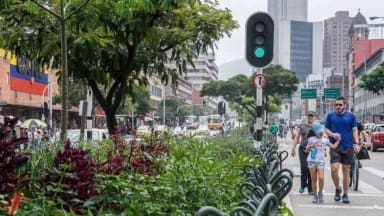
Since 2016, Medellín’s ambitious project has resulted in the creation of 30 ‘Corredores Verdes’, equating to 70 hectares of green space, which includes 20 kilometres of shaded routes with cycle lanes and pedestrian paths.
Impressively, in the just the first three years of the project temperatures fell by a reported 2°C, and officials expect a further decrease of 4 – 5° over the next few decades. More specifically, from 2016 to 2019 average air temperatures in the city’s Green Corridors locations fell from 31.6C to 27.1C, and average surface temperatures dropped by over 10 degrees, from 40.5C to 30.2°C.
Over 2.5 million plants and 880,000 trees have been planted, all carefully chosen to maximise their impact. The corridors have not only reduced the city’s urban heat island effect, but also soaks up air pollutants and sequesters significant amount of carbon dioxide. The air quality, improved dramatically over the 2016-2019 period, where levels of the particulate pollutant PM 2.5 fell from 21.81 µg/m3 to 20.26 µg/m3, and levels of PM 10 from 46.04 µg/m3 to 40.4 µg/m3. Ozone levels dropped from 30.1 µg/m3 to 26.32 µg/m3. In terms of CO2, a study estimated that in just one of Medellín’s corridors, the new vegetation growth would absorb 160,787 kg of CO2 per year.
The shaded cycle lanes throughout the green corridors encouraged 34.6% more cycling and 4% more walking, reducing cars on the roads and adding substantially to the health of the urban population. Residents have more access to vital green, public space with all its associated health benefits. The project has also created employment opportunities, where over 100 people were trained as gardeners, whom now maintain the corridors and 2,600 workers were employed through the project.
Projects such as these are not cheap, with the total investment equalling $16.3 million. According to Medellín’s City Hall the annual maintenance of the corridors costs $625,000 which for a city with growing levels of debt is a substantial outlay. However, the project is ongoing and being developed further.
Medellín’s impressive ecosystem services project is an example to cities across the world, demonstrating how an integrated, nature-based policy can have an extensive impact on the (urban) environment, as well as improving biodiversity, reducing the risks associated with the urban heat island effect – to the end of significantly improving the well-being of its residents.

